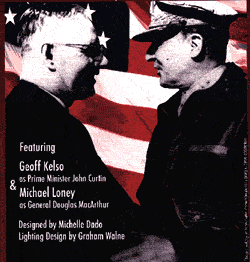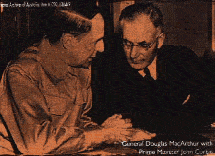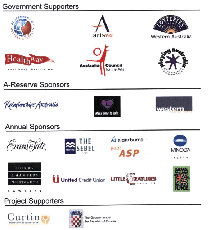By George Blazevic and Ingle Knight with additional
material by Alan Becher. Directed by Alan Becher


26 March, 1942. Prime Minister's Office. Canberra.
In 1941, the recently appointed Labor Prime Minister of Australia, John Curtin, was deeply troubled over the impending fate of his country at the hands of the Japanese. Great Britain, Australia’s traditional ally, was struggling for its own survival in Europe and was utilising nearly all of Australia’s defence forces, leaving Australia virtually undefended and vulnerable to invasion by the Japanese. Curtin appealed to America in his now famous “We look to America” article in the Melbourne Herald on 27 Dec 1941 and followed it up with a radio broadcast to America on 14 March 1942 in which he repeated the phrase and added, “If Australia goes, the Americas are wide open”.
General Douglas MacArthur was subsequently ordered by President Roosevelt to leave his beleaguered command on Corregidor in the Philippines and go to Australia to lead the Allied fight against the Japanese in the Pacific. The first meeting between MacArthur and John Curtin took place on 26 March 1942 in John Curtin’s office at Parliament House (when Shadow Of The Eagle is set). Their relationship would be crucial to the outcome of the war in the Pacific and Australia’s future. How these two unlikely allies subsequently became friends and virtually ran the country between them has been the starting point for our play.
Our main challenge has been dramatising an event about which there is very little evidence, either official or anecdotal. Only Curtin and MacArthur were present during the meeting. It was not recorded what was said. During our extensive research, lead by the extraordinarily diligent staff at John Curtin Prime Ministerial Library, we came across various versions and viewpoints regarding the events of the time, a great deal of which was contradictory. Even now, for example, sixty years later, neither side of politics claims ownership of the defence strategy known as the “The Brisbane Line”.
Through our research, we learned much about the two men, their characteristics, beliefs, health and state of mind. A combination of facts and insights gleaned from those who knew both men, what Curtin and MacArthur said themselves, coupled with the extraordinary pressure both men were under, has led us to explore some possibilities of what might have occurred during this historic meeting and how an extraordinary partnership and friendship was forged at such a critical moment in Australia’s history. A measure of how MacArthur felt about John Curtin was that when he was finally able to return to the Philippines, MacArthur said he wanted President Quezon of the Philippines on one side and John Curtin on the other…
And on the subject of partnership, PTC’s relationship with the John Curtin Prime Ministerial Library staff has been crucial to creating this work. I can’t think of a more friendly, hardworking and supportive organization (other than PTC!). Beginning as collaborators, the two organizations, PTC and JCPML have gone on to form a true partnership; one in which we all take great pride. JCPML continues to provide an ongoing example of professionalism and integrity that I’m sure would make John Curtin proud. To Kandy-Jane Henderson, Lesley Wallace, Lesley Carman-Brown and all the staff at JCPML, my heartfelt thanks.

 George Blazevic, Playwight
George Blazevic, Playwight
Perth born and based, George Blazevic was the first Australo-Croat to be granted an Australia Council literary grant to explore the world of Croatian theatre. His work lead to the consolidation of the links established when his work Nevesinsjka 17 toured Croatia and Bosnia for Deckchair Theatre as part of the Reaching The World Sydney Olympics Global Cultural Program in 1999. These links were further strengthened earlier this year in PTC’s collaboration with the Croatian National Theatre in Zagreb in producing his co-adapted work The Corporal’s Wife for the 50th Anniversary Perth International Arts Festival. George has completed film work for the WA Academy of Performing Arts, productions for the corporate sector and script editing for television documentaries. A former journalist with The West Australian, The Australian and on-air reporter with ABC TV, he also has knowledge of government systems, having worked with the Multicultural and Ethnic Affairs Commission and the WA Arts Council. George is also developing a film drama of his play, Grind Core, which was workshopped by PTC and STAGES in 1999.
 Ingle Knight, Playwright
Ingle Knight, Playwright
Ingle has written over 20 plays, musicals and films. He won the 1999 Premiers Book Award, for his adaptation of Elizabeth Jolley’s novel Milk and Honey. His one-man-show The Exploding Breakfast, about his experiences as writer-in-residence at a theatre in Johannesburg, was produced by Perth Theatre Company and later broadcast on ABC Radio National. Wicked – co-written with Michael Smith was “The Australian” critic’s choice for the 1996 Best New Play of the year in WA. Dolphin Talk – co-written with the cast, toured across Australia, Canada and the USA. Bullyfruit - also for Barking Gecko, was nominated for the 1997 Gold Swan award. Aesop’s Fable written for Barking Gecko tours nationally in 2003. He is currently adapting Louis de Bernieres' novel Red Dog for Black Swan Theatre Company. He also lectures in scriptwriting at Murdoch University. He has performed in over 50 professional theatre productions. In Crystal Clear, he played a young diabetic who goes blind, which earned him a nomination for a Gold Swan award. As the Emperor whose vanity is his blindness, he toured the State in Barking Gecko's The Emperor's New Clothes. TV appearances include roles in Sons and Daughters, Neighbours and Prisoner. Ingle’s play The Getaway Bus was produced by PTC in 2001, and has since toured WA, the Edinburgh Fringe Festival and in August 2003 will embark upon a national tour.
 Alan Becher, Director
Alan Becher, Director
Since settling in WA in 1986, Alan has directed and designed many productions for Swy Theatre Company, the Western Australian Theatre Company and PTC. He has directed over 40 productions of new Australian plays in his career including 16 world premieres. His stage adaptations, which he also directed, include Tom Hungerford’s Stories From Suburban Road, Mudrooroo’s Wildcat Falling and Elizabeth Jolley’s The Newspaper of Claremont Street. Stories From Suburban Road (designed by Michelle Dado) was recreated for the Ensemble Theatre in Sydney on a unique ‘Directors Exchange’ during the Olympic Games and toured nationally in 2002. Alan’s acclaimed production of Tim Winton’s Lockie Leonard, Human Torpedo broke box-office records during the 1995 Festival of Perth and toured nationally in 1996. Alan adapted and directed WA writer Fotini Epanomitis’ novel The Mule’s Foal for PIAF in 2000 and in that year, also directed two new solo works by Ingle Knight, The Getaway Bus (which won the WA Fringe Theatre Award) and The Exploding Breakfast. In 2001, Alan directed Shopping & F***ing and redirected The Getaway Bus for PIAF which toured to the Edinburgh Fringe Festival. Later in 2001, with colleagues George Blazevic and Tomislav Stojkovic he undertook a residency in Dubrovnik to translate and adapt the 200 year old Croatian classic, The Corporal's Wife which had a successful season during PIAF 2003. His highly acclaimed production of Skin Tight recently played to full houses at PICA.
 Geoff Kelso - John Curtin
Geoff Kelso - John Curtin
A NIDA graduate, Geoff established himself in Melbourne in the early 1980’s as one of Australia’s most renowned comedians. In 1984 he joined the ABC TV’s political satire show The Gillies Report and worked with the country’s best political satirists in John Clarke, Patrick Cook and Max Gillies. This was followed by The Gillies Republic and The Dingo Principle and in 1991 he teamed up with Bruce Petty, Andrew Denton and Sue Ingleton in A Royal Commission Into the Australian Economy. In Perth, Geoff has combined work as a dramatic actor with comedy performing and writing. In 1994 he was resident satirist on The Times (Channel 7 Sydney) and more recently wrote and performed for Hansard (ABC Online) and The Stayers (Access 31). Recent acting credits include Popcorn, ART and Copenhagen and he was also the Assistant Director on Career Highlights of the Mamu and on The Island (all Black Swan Theatre). Other highlights include co-creating and performing Bidenjarreb Pinjarra which toured nationally, performing in Lindy Hume’s Opera Australia production of Die Fledermaus in Perth, Sydney and Melbourne, and receiving the Swan Gold Award for Best Actor for Twelfth Night (Black Swan). Geoff looks forward to combining his political insights and his theatrical talents in his portrayal of one of Australia’s great politicians.
 Michael Loney - MacArthur
Michael Loney - MacArthur
Perth born Michael graduated from the WA Institute of Technology with a BA in English in 1978. He continued his studies between 1980-82, with the assistance of a Rotary Foundation scholarship, at the renowned Bristol Old Vic Theatre School in England. He then worked in Britain for the next six years, most notably in Coronation Street (Granada TV), Howard’s Way (BBC), in repertoire work at the Pitlochry Festival in Scotland and tours of England and Ireland in Shakespeare and Youth Theatre. Since returning to Perth in 1988, Michael has worked with all the major theatre companies in WA and in many television series. These include Ship to Shore, Minty, and the soon to be released ABC series Sharknet. In 2000 Michael was awarded the inaugural Equity Award for Best Actor for his role in the PTC/Theatre West production of Speaking in Tongues. Other favourite roles include Sweeney Todd (Hole in the Wall), Dangerous Obsession, Noel and Gertie, Noel Coward in Two Keys and Irish Stew (Effie Crump Theatre), A Midsummer’s Night Dream, Twelfth Night (Shakespeare in Kings Park), and for PTC he has appeared in Face to Face (including the 2001 PIAF production and the 2002 WA and Brazil tour), and Cox Four in 2002.
 Michelle Dado, Designer
Michelle Dado, Designer
Michelle graduated from NIDA in 1988. She spent the following five years based mainly between the USA and the UK, working (and forever learning) in theatre, television and documentary/film making (primarily in L.A. and London). Since returning to Sydney in 1994, some career highlights include her production designs for Denton (Channel 7), The Hub and Inside the Arena (Arena TV, Foxtel) and most recently Roy and HG'S The Monday Dump also for Channel 7. Theatre design highlights include The Shoe Horn Sonata and Fully Committed (Ensemble Theatre), Europe at The Stables and Stories From Suburban Road for PTC and Ensemble Theatre, which was followed by a national tour last year with PTC. Michelle has designed numerous productions and events for Nickelodeon, Channel V, Arena, The Lifestyle Channel, The National Geographic Channel, Optus Vision and the BBC, as well as Channel 7, Foxtel and various independent producers. Michelle also lectures in design at the Australian Film Television and Radio School, AFTRS (since 1996) as well as lecturing at various independent design colleges. Michelle has recently production and costume designed a NSWFTO film The Easter Tide, which will be shown at the Sydney Film Festival this June and the film festival circuit thereafter.
 Graham Walne, Lighting designer
Graham Walne, Lighting designer
Graham has designed the lighting for over 500 productions worldwide. His work ranges from the Bolshoi Ballet in the UK, the USA and at the Bolshoi itself, to the fringe, cabaret, Shakespeare and panto. Most recently he has lit Skin Tight, The Corporal’s Wife and Cox Four (PTC), the Artists for Refugees Concert and The Simple Truth at the Blue Room. Other productions for PTC include The Getaway Bus, Milk and Honey, Third World Blues, Speaking in Tongues, Weekend Breaks, Gasping, and Shopping and F***ing. Graham is also a theatre consultant, with 70 projects to his credit worldwide and he is the Chairman of the WA Institute of Independent Arts Consultants. He was part of the design team for the rebuilding of Shakespeare’s Globe in London and has written several key reports for the State Government on Perth theatres. Graham has also written or contributed to eight technical books and videos on sound, lighting, effects, safety and projection.
 Philippa Stroud, Stage manager
Philippa Stroud, Stage manager
Philippa has been working in various areas of the arts industry over the past ten years. After graduating from WAAPA in 2000 (Stage Management) she carried out a placement with the Edinburgh Fringe Festival. Since returning to Perth she has been working freelance on a variety of shows in the roles of Stage Manager and Production Manager. Her recent shows include Skin Tight, The Corporal's Wife, Cox Four and The Return (PTC), The Other Woman (Steamworks) and Black Swan Theatre), Savage Grace (Steamworks), The Simple Truth (Lyons Productions), as well as various children's and dance concerts.

SHADOW OF THE EAGLE
Director/Dramaturg/Audio Visual Editor - Alan Becher
Set and Costume Design - Michelle Dado
Lighting Design - Graham Walne
Stage Manager - Philippa Stroud
Audio Visual Mastering - Andrew Newnham
Technical Advice - Gavin Tempany
ASM - Kristy Anderson
Seamstress - Emma MacMillan
Lighting Operator - Ian Boase
Lighting Assistant - Sue Ravine
Lighting Assistant - Andrew Beck
Set Construction - Total Production Systems
SPECIAL THANKS TO
Kandy-Jane Henderson, Lesley Carman-Brown, Lesley Wallace, Rosslyn Marshall, David Wylie and David Black from JCPML for their tremendous support and encouragement from the very beginning and through all stages of this project.
Rosalba Verrucci and ArtsEdge for their contribution to the education kit.
Garry Snowdon and Ian Boase from Playhouse Theatre
Bill McCluskey and George Shevtsov for their participation during the developmental workshop
Goldfields Art Centre
Stuart Reid
James Nerva
Mike Frencham
Skin Deep
Maureen at Anthony Murrays
Gascoign Furniture
Norma at Third Avenue Antiques
Peter Millynn
Karen McAloon-Fabatz
Black Swan Theatre
Chris Murdoch at WAAPA
Pat and Tony Stroud
Justine S Hobbs
David Hawkes - PTC wishes him well on his retirement from the ABC

This project has been assisted by the Commonwealth Government through the Australia Council, its arts funding and advisory body.
PTC gratefully acknowledges the assistance of the John Curtin Prime Ministerial Library, the Australian War Memorial, the Australian War Memorial ANZAC Foundation, the MacArthur Memorial Library and Archives, Old Parliament House and FilmWorld for images and film used in Shadow Of The Eagle.
Thank you to Old Parliament House for making available selected original furniture for the set of Shadow Of The Eagle.